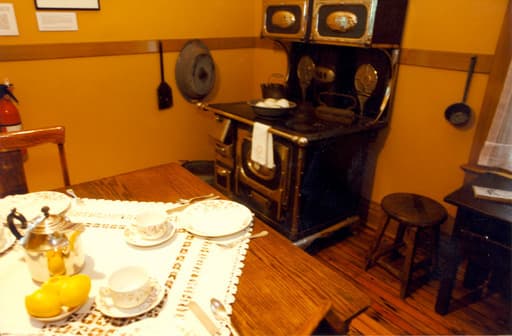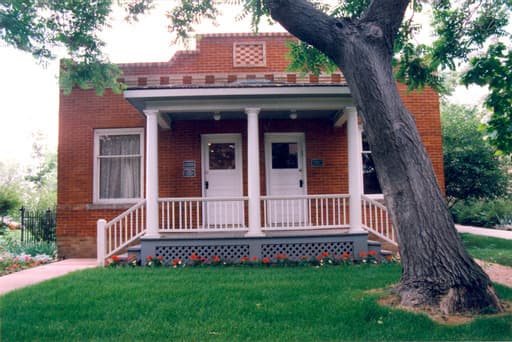Golda Meir, a founding mother of Israel who signed that country's Declaration of Independence and served as Prime Minister during many of its early crises, spent formative years living in an unassuming brick duplex on Denver's west side. The house is now a museum, and on Monday it will host a ceremony honoring the people who worked to save it as a historic home.
Meir's path through Denver on her way to the global stage was circuitous. She was born in Ukraine under Russian control at a time Jews were targeted by pogroms, or violent mobs. Her family fled to the United States and settled in Milwaukee. When she was 14, Meir told her parents she wanted to become a teacher, but they protested, worried that meant she would never marry.
"So they got in a big fight and one day Golda pretended to walk to school," said Lena Fishman, executive director of the Golda Meir House Museum, "but she really got on a train and landed right here in Denver, at Union Station."
Meir moved in with her older sister, brother-in-law and young niece. The house at 1606 Julian Street was cramped -- a small entry, a bedroom and a kitchen. It was typical of the neighborhood in 1913, which was filled with immigrants working to build new lives.

Courtesy of Golda Meir House Museum
Goldie, as she was known, enrolled at North High School where she got good grades. After school she worked at her brother-in-law's cleaning business.
"And then, magic started to happen in the evenings," said Fishman.
The modest house became a hotbed of ideas at night. Her sister and brother-in-law were at the heart of a group of intellectual immigrants who gathered in their kitchen to discuss big ideas like socialism, women's rights and a Jewish homeland. Meir would later point to these kitchen gatherings as the foundation for her political beliefs and leadership.
"It was in Denver that my real education began," Meir wrote in her memoir.
Golda Meir later moved to Palestine and worked for the creation of Israel. She led the country as foreign minister through the Suez Crisis. She was prime minister from 1969-1974, years that included the Munich Olympics, when Israeli athletes were killed by terrorists, and the fourth Arab-Israeli War, sometimes called the Yom Kippur War.
Meanwhile, her years at this Denver house were largely forgotten. In the 1980s, community activist Jean May was doing research for a cookbook of famous Denverites when she stumbled on the connection of the home to Golda Meir. The house was in disrepair and scheduled for demolition. May enlisted the help of state Senator Dennis Gallagher, who personally broke through the construction fence one night to hunt for artifacts from Meir's time there.
"Which I think was illegal," said Fishman. "Although he told me that he would do it again."
Gallagher found family papers and a mezuzah, which is a parchment inscribed with religious text that Jewish people traditionally attach to their door frames.

With support from other community members and politicians including Representative Pat Schroeder, the house was saved, but not without enduring three moves, graffiti and a fire. When it landed at its current home on the Auraria Campus, a professor assumed stewardship of the house museum for years, until a professional director was recently hired. Meir's report card and the items found by Sen. Gallagher are all on display.
Monday's rededication of the museum, which will honor the people who saved the house, will feature a special menu item: Golda Meir's recipe for chicken soup, which was released by the Israeli government in 2012.
Fishman said the caterer is especially excited about that: "He told me that he must make this chicken soup because Golda Meir was his mother's hero."
Golda Meir's recipe for chicken soup
Ingredients:
(Note: Meir did not include amounts in her recipe.)
Chicken
Parsley
Celery
Carrots
Onion
Salt
Pepper
Paprika
Matzo meal
Rice (optional)
Soup:
Boil the chicken, parsley, celery, cut-up carrots, peeled onion, salt, pepper, a pinch of paprika, until the chicken is tender. Strain soup.
If you like rice, you may add it after straining the soup, bringing to a boil for another quarter of an hour.
Kneidlach:
The matzos (unleavened bread) are soaked in cold water until soft, then squeezed dry and crushed with a fork. Add fried onions and a little oil, some parsley, salt, pepper and two beaten eggs. Add enough matzo meal for binding. Make into small balls, set aside for one hour. Half an hour before serving, drop the balls into the boiling soup and cook for about half an hour.











